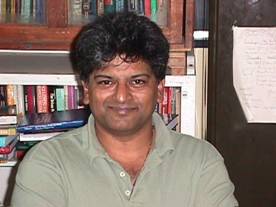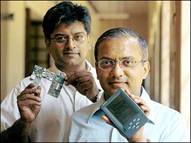 |
||
|
|
|
||||||||||
|
||||||||||
|
bitsaa.org BITS Pilani |
Education & Academics
Profiling Dr. Vijay Chandru, Winner of the First Dewang Mehta Award for Innovation, India's highest honor for innovation
When Academicians become Entrepreneurs: The second in a series.
By Aanand Krishnan
Inventor of India’s most famous PDA – The Simputer,
Founder of India’s first VC funded bioinformatics company – Strand
Genomics and Pico Peta – listed by MIT as one of the
7 most exciting university spinoffs globally,
and recipient of the highest honor for Innovation in India, the
First Dewang Mehta Award, Professor Vijay Chandru has some outstanding
learnings for us all in this somewhat nostalgic, somewhat outspoken,
gripping interview.
Let’s
start with your memories of BITS.
Very
fondly! I grew up all my life in Chennai, though my mother was from Andhra
and my father, from
I
didn’t like the basic courses in physics, math and chemistry in the
first few semesters. I came to my own after we started to concentrate on
core discipline courses in Electrical and Electronics. We used to share
books that were loaned to us from the BITS library, because books were so
expensive in those days.
Three
incidents during my BITS days are firmly imprinted in my memory.
Listening
to Stafford Beer lecture about Cybernetics and Operations Research - I
ended up doing my PhD in Operations Research. Acting in Edward Albee's
"The Zoo Story" with JK on the Museum Lawns (Teaching/Lecturing
has always felt like being on stage). An evening of music in my hostel
room with Dinesh Sharma (Panditji) singing and playing the harmonium, and
Ashok Pati playing the tabla. I recorded this session and have played the
tape whenever I needed inspiration.
We
had three strikes during my time at BITS, one in the very first year.
Mayur, which later became Oasis, was started during our time.
As
far as extracurriculars were concerned, I was captain of the BITS cricket
team and part of the swimming team. I was also actively involved in the
English Drama Clubs and directed and acted in a number of plays.
|
Photo credit: Annanova Name:
Dr. Vijay Chandru (back) Academic Positions:
Professor of Computer Science & Management, IISc Bangalore,
Honorary Professor, National Institute of Advanced Studies Business Position:
Founder & CEO, Entrepreneurial Ventures: ·
Founder Strand
Genomics, a VC funded bioinformatics company ·
Co-Inventor of the Simputer
Awards/Recognition: Dewang
Mehta Award for Innovation ; Asian Innovation Awards Special
Mention, Rabobank Bio-innovator of 2003 Education:
PhD, Operations Research,
MIT (1982), MS Systems, UCLA (1977), BE (Hons) EEE, BITS (1975) |
As
academics we (Ramesh Hariharan, Swami Manohar, V Vinay and I) were
exploring the interface of biology and CS by around 1994. In 1997 we
started the Perceptual Computing Lab at IISc. After about two years of
consulting, we were convinced that we could build world-class technology
and wrote to IISc administration asking for permission to start
There
must have been many intellectual, technical and logistical
challenges to start such a venture ....
The
real challenge is to stay completely focused on the ventures. The rest
follows. The metaphor of parenting is particularly apt.
Is
BITS
Pilani offers Pharmacy, Biological Sciences and Computer Science as
undergraduate degrees. What would you suggest BITS should do to become
better at combining these resources to suit the upcoming trends in
bioinformatics?
It
is best not to combine these streams. Students can pick electives to cross
boundaries. At
What
are your thoughts on the BITS connect program and its effort to link the
whole of BITS through wireless access ?
Starting
off with a very concrete program like the BITS Connect Program is a good
way of getting the alumni focused. Wireless access is obviously an
appropriate technology focus. I was at MIT last week and it is a joy to be
able to work almost anywhere on campus with a laptop, handheld etc. I
would love to work with the team and take the Amida Simputer into the
campus (we have demonstrated WiFi/ WLL/ CDMA/ GSM/ RF compatibility).
 You
have studied or worked in such renowned schools as MIT, IISc,
Purdue, U Penn and so on. How
has the BITSian experience helped you deal with academic and business
problems and challenges?
You
have studied or worked in such renowned schools as MIT, IISc,
Purdue, U Penn and so on. How
has the BITSian experience helped you deal with academic and business
problems and challenges?
I
always claim that the BITS experience was the perfect annealing of a young
body, mind and spirit. With a temperature swing of 40-50 degrees
Fahrenheit in a day we were certainly physically annealed.;-)
More
seriously though, I believe BITS gave us a very good balance of theory and
hands on practice. There was healthy respect that existed between the two.
The same theme continued at MIT and Purdue and to a lesser extent at IISc.
I was well prepared to study matroids (my PhD thesis) and roll up my
sleeves and work on CAD/CAM software - some of what I did at Purdue. I owe
BITS a great debt of gratitude for this balance. BITS also gave me a sense
of self-actualization without feeling competitive. I believe that the
absence of a "JEE" for BITS is actually a blessing as we did not
have this notion of a "rank" that we carried as a chip on one's
shoulder all through life.
What,
in your mind, is the single most important thing we need to do to improve
our output, in terms of research?
The
key is of course to attract enthusiastic and bright young faculty. For a
young professor to get a research track going along with teaching
responsibilities, the alumni could give a leg up by providing a startup
grant - say about 10 lakhs - will allow the person a chance to hire a
postdoc / research assistant and get a small computing environment set up
etc. This is routinely done at a place like IISc. Getting organizational
help for grant proposal processing is also important. There are a lot of
grants given by DST, MCIT, CSIR etc within India and many more
internationally that can be a good way of bootstrapping research. Finally,
to create a great undergraduate institution you also need good research -
this is the lesson one has learnt from places like MIT and UPenn.
You
have been both a researcher and an entrepreneur. What separates research
from the spirit of entrepreneurship ? How do we cultivate the
entrepreneurial temper in young students?
I
think one can be entrepreneurial in research as well. Building a team,
getting your funding organized, sticking your neck out a bit by trying
ambitious projects - could very well define a research career track as it
does an entrepreneurial one.
What
are your future career plans - at the academic and entrepreneurial level?
The two companies are now poised to move into product sales, marketing and management. I believe it is time for a founder (of my vintage) to step back and allow young professional managers to run the show. It has been a riot for the last three years and I have had a great time. I will return to academics soon but with new visions now to drive research agendas that are motivated by some experiences with the companies.
■
(c) Copyright 2003 BITSAA International Inc.


